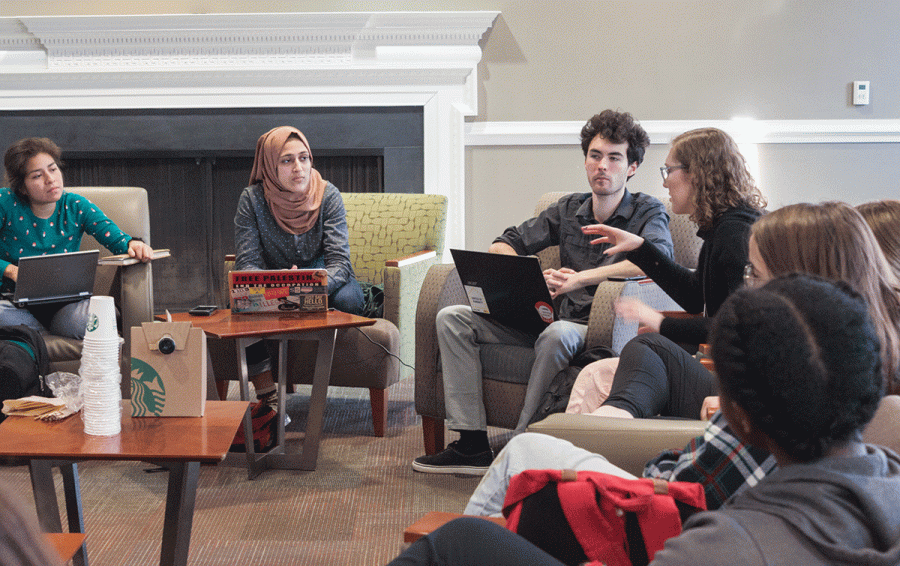Guilford Amnesty International chapter defends human rights
In 2016, Guilford students Melissa Fourrier, Juliana Evans-Anfom, Maggie Albert, Spencer File and Haya Al-Attar launched the Guilford chapter of Amnesty International, a global organization dedicated to opposing human rights violations.
Fourrier initially proposed the idea to peers in her peace and conflict studies class as a way to raise on-campus awareness of human rights violations.
“A big reason why Melissa wanted to start this was because she totally believes in the values and principles espoused in the United Nations Universal Declaration of Human Rights,” said File, the Guilford chapter treasurer. “She wanted to be able to support that through the founding of this club.”
One of Amnesty’s major focuses is petitioning cases which receive little attention from other organizations and the media.
“The thing I like about Amnesty International as opposed to other human rights organizations is that they choose very specific cases, and you’ll know the whole life story of the person you’re tabling for or that you’re writing letters for,” said Tibaria Alnouri, the student coordinator. “I think that personal touch is super humanizing and huge to our work.”
Every semester since its founding in 2016, club members vote for issues to focus on. Currently, the club is focused on immigrant and refugee rights, gun violence and death penalty cases.
In January, the club tabled for Vernon Madison, a 67-year-old African-American man who was sentenced to be executed on Jan. 25 for the 1985 shooting of Julius Schulte, a white police officer in Alabama. Madison has suffered from mental delusions since he was a teenager. In 2016, a neuropsychologist diagnosed him with vascular dementia and found that he was unable to remember having killed Schulte. Amnesty members gave Guilford students the number of Alabama Gov. Kay Ivey to urge her to give Madison a stay of execution.
30 minutes before the execution was scheduled to occur, the Supreme Court issued a stay.
“One thing to remember about these cases is that they’re super super slow,” said Fletcher Brooks, death penalty case coordinator. “Whether it’s a teenage girl who’s been in prison for a big chunk of her life or a prisoner who’s been on death row for decades, a large part of it is just raising awareness.”
Amnesty also raises awareness by hosting open discussions. On Feb. 3, the club participated in a discussion about gun violence.
“The reason why nothing legislation-wise has been done towards gun control or alleviating factors which contribute to instances of gun violence is because it’s a problem of the media cycle,” said File. “It’s a two-week cycle where two weeks’ worth of attention are given to the tragedy by the media. And afterward, maybe it’s mentioned a month later, but between the two weeks and the month, it’s no longer an issue people are worried about.”
Amnesty also takes on cases for prisoners of conscience, people imprisoned for holding political or religious views that are not tolerated by their government.
During the past few weeks, Amnesty has been tabling for Ahed Tamimi, a 17-year-old Palestinian activist who was arrested during a raid on her home on Dec. 19. Amnesty members passed out information and asked Guilford students to call their representatives to sign onto the Promoting Human Rights by Ending Israeli Military Detention of Palestinian Children Act, which is designed to stop American military aid to Israel going toward the detention of children.
The Israeli military pushed back Tamimi’s court date from Feb. 6 to Feb. 13.
“It’s just a strategy that the Israeli government uses … to make the supporter lose interest, make less noise,” said Amy Mejia, legislative coordinator. “It just benefits them. This whole time while they are trying to maneuver through making less noise, these people are still unlawfully there.”
By tabling for cases such as Tamimi’s and Madison’s, Amnesty focuses on both global and domestic human rights issues.
“It’s important to know about how we are still being of influence for countries that are violating human rights,” said Mejia. “There are human rights violations within (the U.S.), it’s just shadowed. It’s painted differently.
“They’re silhouettes instead of being right in our faces.”
Alnouri agreed with Mejia about the way in which domestic human rights violations are viewed.
“If we were to complain about a human rights violation in the U.S., the opposition response would be, ‘Oh, you have it good, at least you have this, at least you’re not living in: name any third world country,’” said Alnouri. “Having a universal standard that we should all be striving toward is a way better measure than comparing ourselves to the most under-resourced, underdeveloped countries, and then expecting us to be thankful to the state for not creating that.”
The chapter plans to attend the Amnesty International Annual General Meeting from Feb. 23-26, in Rockville, Maryland. Guilford chapter members will meet with other members from around the country to discuss the current global state of human rights and design a strategy for the upcoming year.
“The AGM … gives you a good pulse of what’s going on nationwide in terms of organizing,” said Alnouri. “Everyone is going to get what they need to get out of it.
“It will gear us for the rest of the semester, and the next coming year and years to come I hope.”









